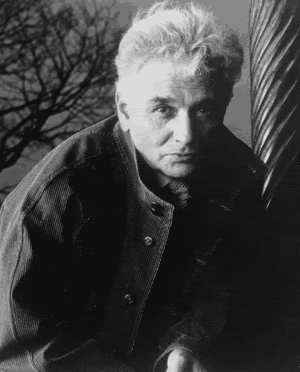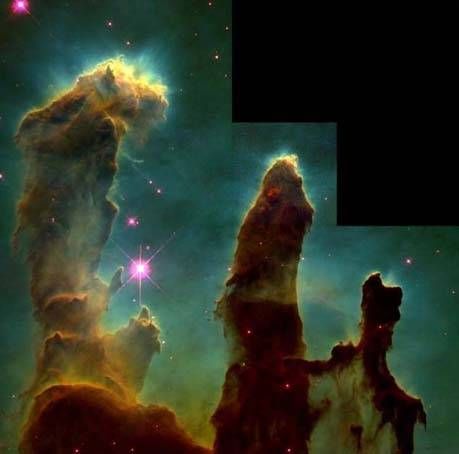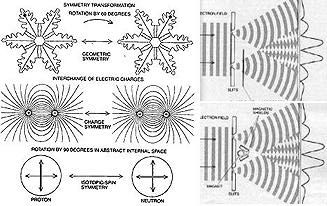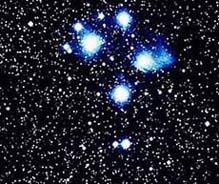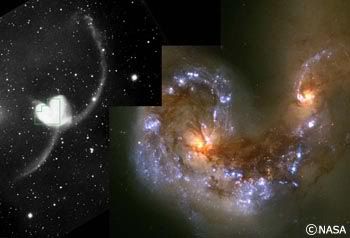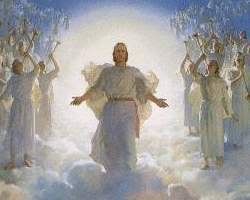 To answer this question we must know what is meant by "supernatural." Thus part I will deal with the issue of defintion and the logic of evidence, part II with actual empirical evidence.
To answer this question we must know what is meant by "supernatural." Thus part I will deal with the issue of defintion and the logic of evidence, part II with actual empirical evidence.On CARM atheist board
Apostate Abe commenting on post by Occam 1/3/08Abe says: "I was made aware of a post that Occam made back in August. He was challenged by Matt Slick to give reasons for being an atheist. He gave three reasons, and the second one was this:"
Quote:
Originally Posted by Occam View Post
2) It's impossible in principle to find empirical evidence that could count as a warrant for belief in the supernatural.
Suppose tonight you look up at the sky and see that the stars have all shifted. Now, in consecutive constellations, the words "MATT SLICK, I AM THE LORD YOUR GOD." are spelled out above your house. Evidence for a supernatural intervention? Occam's razor says no. There are other, more parsimonious, explanations for this phenomenon. The kids down the block may have set up a big black tent over your house, poking holes for the stars and shining light through the holes, to give but one example. The fact is, there will always be an explanation for a given empirical phenomenon that doesn't invoke the supernatural. Even if there wasn't, you would still be perfectly justified in saying, "I don't know why it happened. Let's try to find out!" and then going to look for a natural explanation.
Is it impossible in principle? If the stars shifted would that not be good indication? This is an absurdity for several reasons, but before listing them, the major point I want to prove here is that it is easy to give empirical evidence of the Supernatural and I do it all the time. But before we can can understand this several things have to be in place:
(1) The concept of the Supernatural which most atheists reject is not the concept the Chruch teaches as Supernatural, and it is not which Christian mystics first began calling "supernature" with Dionysus the Areopoagite the 500's.
(2) If the stars shifted it would certainly be evidence of supernatural power, especially they spelled out a Biblical message; of course it would be easy to verify that the stars had actually shifted, there would be no danger of being food by children that would be quite easy to verify. The star painted tarp would be detected very quickly.
(3) The extent to which one might raise doubt as to the origin of this miracle would be the same extent to which one can doubt own existence, or the rising of the sun tomorrow.
(4) All Occam has really done here is to demonstrate the impossibility of proving anything.
That kind of sophomoric argument is not impressive. Yes we can doubt anything, has za! Is that really a reason to doubt God? This is the kind of amazing realization that fascinates philosophy 101 students when they are Freshmen.
But wait Occam is not through:
There will, I fear, be accusations that I'm irrationally, indefensibly biased against the use of the supernatural as an explanation. I will be accused of constructing this principle just for the sake of closing my eyes to any and all evidence. That simply isn't the case, and to demonstrate that it isn't I will give the basis for the argument here: my argument above is based upon the following principle: any explanation for a phenomenon that doesn't invoke violations of natural regularities will be more parsimonious than one that does. This principle is clearly valid.
Actually, this principle is clearly circular. All he's really said is "you can't prove the supernatural because its not naturalistic and so by definition it can't exist because we can only accept naturalistic concepts as existent." Where does he say? when he says anything that doesn't evoke
violations of natural regularity, he's actaullyk saying
Only natural regularities are valid as existent. which is the same as saying (just the reverse order of putting it) any supernatural order has to be ignored from reality a prori. Hence all he has really said is
"there can't be empirical evidence of the supernatural because by definition we wont allow it!"Thus his dictum is merely circular: there is not proof of the SN because it's excluded by the rules,and the rules exclude it because there's no proof of it. How could there be proof of it when you don't allow to begin with? Not content to just use circular reasoning, Occam argues from analogy:
Your wallet goes missing, what's more likely: fairies stole it, or there was a massive CIA conspiracy to take your lunch money? Convoluted as the second one sounds, it is the more parsimonious of the two. The fact is that there is no rational, objective criterion by which to say that an empirical event was supernaturally caused. So, we must now constrict our search for God-evidence to the realm of the a priori.
This is argument from analogy because he expects us to believe that sense this case has a parsimonious naturalism then all cases of parsimonious naturalism must be true. Of course this case is merely defend as true because we are told up front that all naturalistic causes must be more rational than supernatural regardless of how inane they are. What Occam says sounds logical to an atheist, because atheists don't think about logic, they think about opinion. They think 'O I don't believe in faeries, we know the CIA exists, even thought hey wouldn't want your lunch money that makes more sense than faeries. The total lack of evidence for faeries is a fine reason not to believe in them, that is why the CIA is a more parsimonious answer, not because its' naturalistic and faeries are supernatural. We know that the CIA exists, even though ti probably doesn't need lunch money. We don't know that faeries exist, thus they are not as logical a solution. We can't say that because fairies are less parsimonious than the CIA therefore supernatural is less parsimonious than naturalistic cause and effect. In the
Charles Anne's Lungs the supernatural is more parsimonious because no natural explanation can explain how lungs can grow back over night. This is just not supposed to happen.(scroll down to
"an old case but interesting--Society for Little flowers". We cannot rule out evidence of supernatural on the premise that it's not parsimonious. That is backwards reasoning. Being parsimonious is not an argument to justify evidence, the evidence is required to justify parsimony. To rule it out on the grounds that a priori SN cannot be parsimony is just to pre judge the case prior to evidence.
Just another case of atheists confusing their opinions with logic.
Now Here Apostate Abe joins the discussion:
Reading that, it makes a lot of sense, yes? You don't want to believe it, but it seems true.
Yes, the argument is true for an everyday environment that can be made sensible by modern scientific laws and explanations. But, I profess an alternative. If the gods made themselves an ordinary part of the human environment, then that is evidence for the gods. That means that no single "miracle" can ever work to prove the gods for a reasonable person. But, if I were living in one of the magical environments of The Chronicles of Narnia, The Lord of the Rings, Harry Potter, His Dark Materials, Genesis, Exodus or the New Testament gospels, where miracles and magical stuff happen all around and all about and all the time, then the supernatural paradigms easily supersede the naturalistic paradigm, and the gods can more easily follow.
I was watching TV, and I caught the end of the comedy film, Bewitched. The heroine, who is a powerful spell-casting witch, is in love with a TV actor played by Will Ferrell. She feels guilty that she has hidden her powers from him, and she finally professes that she is a witch. Ferrell says, "Oh, a witch, well, don't be so hard on yourself!" And she says that she can cast spells, and she attempts to prove it. She magically puts a mustache on another guy's face, she instantly puts an umbrella in Ferrell's drink, she puts an image of her face on a TV screen and makes her talk. But Ferrell is convinced only that she is a very good amateur magician. She summons a broom from nothingness, and Ferrell thinks it is a collapsible broom from her sleeve. He examines it--the grooves, he thinks, are very well hidden. And then she makes the broom fly, taking Ferrell high up to the air along with it, and he is clutching the broom for his life. He is brought down, finally convinced, and is scared sheetless. He shouts, "Have you made me pregnant? I don't wanna be pregnant!"
I figure my reaction would be similar. There can be a limit to the naturalistic explanations, and a single supernatural explanation may succeed if it becomes normal.
That's a good point, but the fact of the matter is SN does overlap with natural because the definition of Supernatural is not some alien state of affairs such that one negates the other. Atheists think Supernatural means another realm. magic, psychic powers, the stuff Harris believes in. But in fact that is not what it means. It means the power of God to raise human nature to a higher level. That power, in and of itself is of necessity manifest in the natural realm and thus has to overlap in such a way that we find material traces of it. In fact we do, before turning to that I will deal with the definition of supernatural.
See the article: * "Christianity and the Supernatural" by Eugene R. Fairweather. in
New Theology No. 1 by Martin E. Marty, Dean G. Peerman
second major source: Scheeben, Mathias Joseph. Nature And Grace. trans. Cyril Vollert, ST. Louis:Herder Book
then: Willey, Basil. The Seventeenth Century Background: studies in The Thought of The Age In Relation to Poetry and Religion. London: Chatto and Windus, 1934, seventh impression, 1957.
To see a complete Bibliography look
here Author(s) of Review: Paul L. Meacham
The notion of "Supernatural" is a misnomer to begin with, because modern people construe the idea as another place, an actual location that you can go to. It's the unseen invisible world that is filled with ghosts and magic and so forth. It's in the realm where God can heaven are, we suppose. But what they don't' realize is that this is the watered down, dilapidated concept. It's not even understood well by Christians because it was destroyed in the reformation.
The term "supernatural" comes from the term "supernauturalator" or "Supernature." Dyonisus the Areogopite (around 500ad) began talking of God as the supernaturalator, meaning that God's higher nature was the telos toward which our "lower" natures were drawn. St.Augustine has spoken of Divine nature as "Supernature" or the higher form of nature, but that is speaking of nature in you, like human nature and divine nature.
In the beginning the issue was not a place, "the realm of the supernatural" but the issue was the nature inside a man. Human nature, vs. divine nature. The Sueprnatural was divine nature that drew the human up to to itself and vivified it with the power (dunimos) to live a holy life. This is the sort of thing Paul was talking about when he said "when I am weak I am strong." Or "we have this treasure in earthen vessels." The weak human nature which can't resist sin is transformed by the power of the Godly nature, through the spirit and became strong enough to resist sin, to be self sacraficing, to die for others ect ect.
This was the "supernatural" prior to the reformation. It was tied in with the sacraments and the mass. That's partly why the Protestants would rebel against it. Austine (late 300s early 400s) spoke of Christians not hating rocks and trees, in answer to the assertion that Christians didn't like nature. But the extension of the natural world as "nature" didn't come until latter. The idea of "the natural" was at first based upon the idea of human nature, of biological life, life form life, that's what the Latin natura is about.
Prior to the reformation Christian theologians did not see the supernatural as a separate reality, an invisible realm, or a place where God dwells that we can't see. After the reformation reality was bifurcated. Now there came to be two realms, and they juxtaposed to each other. The realm of Supernature, is correlated to that of Grace, and is holy and sacred, but the early realm is "natural" and bad it's myered in sin and naural urges.
But all of that represents a degraded form of thinking after going through the mill of the Protestant Catholic split. The basic split is characterized by rationalism vs feideism. The Catholics are rationalists, because they believe God is motivated by divine propose and wisdom, the Protestants were fiedeists, meaning that faith alone apart form reason because God is motived by will and sheer acceptation, the desire to prove sovereignty above all else.
The rationalistic view offered a single harmony, a harmonious reality, governed by God's reasoned nature and orchestrated in a multifarious ways. This single reality continaed a two sided nature, or a mutli-facets, but it was one harmonious reality in wich human nature was regeuvinated thorugh divine nature. But the Protestant view left Christian theology with two waring reality, that which is removed from our empirical knowledge and that in which we live.
The true Christian view of the Sueprnatural doesn't see the two realms as juxtaposed but as one reality in which the natural moves toward its' ground and end in divine nature. It is this tendency to move toward the ground and end, that produces miracles. A miracle is merely nature bending toward the higher aspect of Supernature.
but with the Protestant division between divine sovereignty, acceptation and will motivating the universe, we mistake univocity and equivocity for nature and supernature. We think nature and supernature are not alike they are at war, so difference marks the relationship of the two. But to make the Suepernatural more avaible they stress some aspect of nature and put it over against the rest of nature and pretend that makes it sueprnatuarl, this is univocity, it's the same. So will and acceptation, sovereignty, God has to prove that he is in charge, these are all aspects of univocity.
It's the natural extension of this bifurcation that sets up two realms and sees nature as "everything that exits." or "all of material reality" that sets up the atheist idea that supernatural is unnecessary and doesn't exist.
Historical Overview: SN and Rise of Science
The medieval Christian doctrine of the supernatural has long been misconstrued as a dualistic denigration of nature, opposed to scientific thinking. The concept of supernature, however, is not a dualism in the sense of denigrating nature or of pitting against each other the "alien" realms of spirit and matter. The Christian ontology of the supernatural bound together the realm of nature and the realm of Grace, immanent and transcendent, in a unity of creative wisdom and purpose, which gave theological significance to the natural world. While the doctrine of supernature was at times understood in a dualistic fashion, ultimately, the unity it offered played a positive role in the development of scientific thinking, because it made nature meaningful to the medieval mind. Its dissolution came, not because supernatural thinking opposed scientific thinking, but because culture came to value nature in a different manner, and the old valuation no longer served the purpose of scientific thinking. An understanding of the notion of supernature is essential to an understanding of the attitudes in Western culture toward nature, and to an understanding of the cultural transition to science as an epistemic authority.
The ontology of supernature assumes that the natural participates in the supernatural in an ordered relation of means and immediate ends, with reference to their ultimate ends. The supernatural is the ground and end of the natural; the realm of nature and the realm of Grace are bound up in a harmonious relation. The Ptolemaic system explained the physical lay-out of the universe, supernature explained its theological relation to God. The great chain of being separated the ranking of creatures in relation to creator. The supernatural ontology is, therefore, separate from but related to cosmologies. This ontology stands behind most forms of pre-reformation theology, and it implies an exaltation of nature, rather than denigration. This talk of two realms seems to imply a dualism, yet, it is not a metaphysical dualism, not a dualism of opposition, but as Fairweather points out, "the essential structure of the Christian faith has a real two-sidedness about it, which may at first lead the unwary into dualism, and then to resolve ... an exclusive emphasis on one or the other severed elements of a complete Christianity...such a dissolution is inevitable once we lose our awareness of that ordered relation of the human and the divine, the immanent and the transcendent, which the Gospel assumes." Yet, it is this "two-sidedness" which leads unwary historians of into dualism.
In his famous 1967 article, "The Roots of Our Ecological Crisis," Lynn White argued that the Christian belief of the Imago Dei created "a dualism of man and nature;" "man shares in God's transcendence of nature." This notion replaced pagan animism, it removed the "sacred" from the natural world, and with it, inhibitions against exploiting nature. Moreover, by the 12th century, nature became a source of revelation through natural theology. In the Latin West, where action prevailed over contemplation, natural theology ceased to be the decoding of natural symbols of the divine and became instead an attempt to understand God through discerning the operation of creation. Western technology flourished, surpassing even that of Islamic culture (although they still led in theoretical pursuits). Thus, White argues, medieval theology did allow science to grow, but at the ultimate expense of the environment.
The insights of feminist scholarship, however, suggest an even more subtle argument for the denigration of nature. Feminist theologian, Rosemary Radford Ruther, argued that there is an identification between the female and nature, the male and transcendence. Women have been disvalued historically through the association between female sexuality and the "baseness" of nature. Londa Schiebinger, calls attention to the fact that the Judeo-Christian cosmology placed women in a subordinate position. Gender was more fundamental than biological sex, and it was a cosmological principle, "...Men and women were carefully placed in the great chain of being--their positions were defined relative to plants, animals, and God." The subordination of women was predicated upon their position in nature. "Male" and "Female represented dualistic cosmological principles penetrating all of nature, principles of which sexual organs were only one aspect. One might suspect that the place of women on the great chain of being is indicative of the true status of nature itself in Christian ontology; an overt denigration of women indicates a covert denigration of nature.
